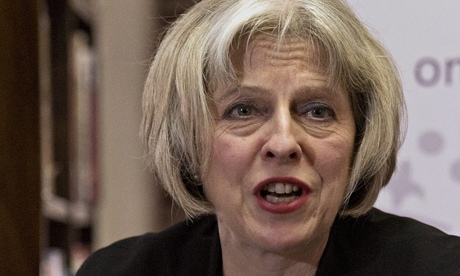With Leon Brittan Gone, We’ll Never Know about the ‘child Abuse Dossier’
By Jim Gamble
Home secretary Theresa May. ‘The government’s handling of this process has been disastrous; they simply don’t do detail. They don’t take time to listen, plan or consider better options.' Photograph: Will Oliver/EPA Leon Brittan’s death is a personal tragedy for his family, friends and former colleagues, to whom I offer my personal condolences. But a wider tragedy stretches beyond that intimate circle, as the opportunity for him to give evidence to the child abuse inquiry, to clarify issues concerning allegations of a missing dossier, has been lost forever. This is a consequence of the failure to deliver the inquiry, which was initially launched by the home secretary in July 2014. Other jurisdictions have managed inquiries, so why can’t we? Why is the child abuse inquiry in Northern Ireland moving forward with some success, for instance, while the best Westminster can do is two false starts? It boils down to trust and leadership. The bond of trust that was broken when children who should have been cared for and protected were abused is not one that will be easily mended. Abusers used their position of power and/or the influence and reputation of the institution they represented to maintain a veil of secrecy. They believed their power and control over the lives of their victims was absolute; but few will be sleeping easily tonight. Given the relationship between those institutions, powerful individuals and the state, it’s insulting to expect survivors of such abuse to accept the imposition of an inquiry on trust alone. While some within government claim credit for setting up the inquiry, survivors had been calling for one for many years, and many feel it was the alleged destruction or loss of so many documents at the Home Office, and speculation about who did what and when, that finally forced a government response. Successful engagement with these issues in other countries has been typified by strong, ethical leadership – leadership that acknowledges that what happened was wrong, and an acceptance that many institutions and the individuals within them have been complicit. Critically, a leadership that accepts that the search for truth must be informed by those who suffered and survived – not those who fear being held to account. While inquiries in Northern Ireland and Australia have been structured differently, they have had some things in common: early consultation with survivors, a significant degree of consensus, and investment and statutory powers to ensure independence, removing control from government. From Theresa May’s first utterances in the House of Commons, it was clear that this government did not intend to relinquish control. Their approach to the alleged destruction or loss of documents in the Home Office and their unsuccessful appointment of the first two chairs has reinforced the perception that they are more interested in controlling messages than commissioning a fundamentally survivor-focused independent inquiry. The government might be well-intentioned, but its bungling and haphazard approach to these most sensitive issues has compounded the hurt of many survivors, their families, supporters and friends. In Westminster last week there was an event organised by the White Flowers Campaign group, which commemorated survivors of child abuse. Afterwards, I sat in a crammed House of Commons committee room, filled with more than 400 survivors, whistleblowers and child protection advocates. As I listened to their stories, hopes, fears and expectations, I realised that what was happening in that room was truly remarkable. Harnessing the power of survivors’ experience must be the next step for the inquiry. For all that I have said about this government, it did commission an inquiry, and I don’t think it’s too late for it to salvage something positive from it. It can do this by pausing and planning a more sensible and sensitive survivor-focused approach. This is what I think should happen. The government should first and foremost establish a fund to support survivors. This would give survivors better access to specialist services, resources and other support. This would be an immediate recognition of the fact that they have been let down over many years by establishment bodies and successive governments. The inquiry should begin/recommence with regional and national survivors’ forums. Such forums need to be as inclusive as possible and should be asked to elect an advisory panel. This panel would provide advice and oversight from a survivors’ perspective to government. It would provide a forum to discuss the pros and cons of different types of inquiries, that is, statutory vs royal commission. A chair should then be appointed and an expert panel established via a transparent process. All this would be overseen and informed by the survivors’ oversight panel. While survivor experience must be represented, the expert panel would also require investigators, academics and other appropriate child protection professionals. I am sure many of the individuals on the current panel are good people, but the process lacks transparency and therefore undermines the confidence of many survivors in it. This approach would be a good first step in the long process of rebuilding trust. Once established, the inquiry should be fundamentally independent and that includes from government. An inquiry imposed by government is very different to one facilitated by it. The government’s handling of this process has been disastrous; they simply don’t do detail. They don’t take time to listen, plan or consider better options. They could do worse than consider the approach taken in Australia and Northern Ireland; put party politics and political point-scoring to one side, collaborate with others, and listen to survivors.
|
.
Any original material on these pages is copyright © BishopAccountability.org 2004. Reproduce freely with attribution.
